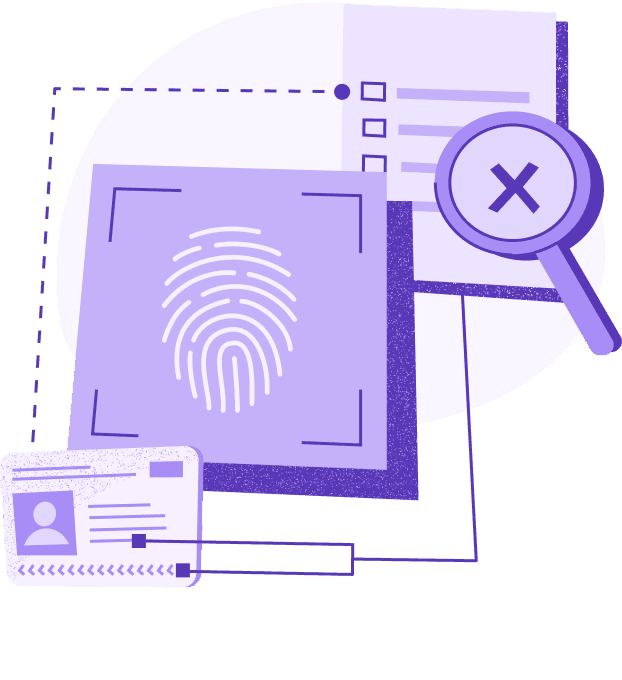Article
5 min read
A Guide to Employee Background Checks in Greece
Employee background checks
Legal & compliance

Author
Michał Kowalewski
Last Update
September 05, 2025

Table of Contents
What employers should know before running background checks in Greece
Are background checks legal in Greece?
What types of background checks are illegal in Greece?
Industries where background checks are common in Greece
Types of employee background checks in Greece
Background check mistakes to avoid in Greece
Step-by-step guide to employee background checks in Greece
Run employee background checks with Deel
Key takeaways
- Background checks are a common practice in Greece, especially for certain sectors like finance and healthcare. However, employers must comply with GDPR and local data protection laws, which require transparency and candidate consent
- Greek law prohibits accessing personal information concerning political views, religious beliefs, or sexual orientation without consent. Social media deep dives are also discouraged. Background checks should focus on job-relevant information
- Failing to comply with data protection laws during background checks can result in significant fines for companies in Greece. The GDPR outlines a tiered system of fines based on the severity of the violation
Employee background checks should be an integral part of your hiring process in Greece. Although not mandatory, they are a common practice, especially in finance, banking, healthcare, education and IT positions.
Greece's evolving economy and robust education system make it an appealing destination for talent acquisition, particularly in sectors like technology and tourism. The workforce is known for its diverse skill set, cost efficiency, and strong English language skills, easing communication barriers. Hiring in Greece requires compliance with GDPR and local data protection laws, especially for background checks, which require explicit candidate consent.
Understanding these legal nuances is vital for compliant and effective recruitment processes.
In this article, you’ll learn:
- How to run an effective and legal employment screening in Greece
- What are the common types of employee checks in Greece
- How to carry out a thorough employee screening process, step by step
- What mistakes to avoid when performing a background check in Greece
What employers should know before running background checks in Greece
An employee background check is the process of verifying a potential hire’s work history, education, professional qualifications, and any criminal records they might have. It’s particularly beneficial to run before finalizing an employment offer or signing a contract, ensuring the candidate meets the company's standards and requirements.
Running background checks in Greece requires employers to comply with the European Union’s privacy laws outlined in the General Data Protection Regulation (GDPR), and Greece’s own Hellenic Data Protection Authority (HDPA).
-
General Data Protection Regulation (GDPR): As the cornerstone of privacy law in the European Union, GDPR establishes stringent guidelines for data protection and privacy for all individuals within the EU and the European Economic Area. It emphasizes the principles of data minimization, consent, and individual rights, granting people control over their personal data while imposing heavy fines on organizations that fail to comply.
-
Hellenic Data Protection Authority (HDPA): Serving as Greece's national authority, the HDPA is responsible for ensuring compliance with GDPR within Greece. It oversees the enforcement of data protection laws, providing guidance to organizations, handling complaints, and taking action against violations. The HDPA plays a crucial role in protecting personal data rights and fostering a culture of privacy and security.
Are background checks legal in Greece?
Yes, employee background checks are legal in Greece, but they are subject to strict regulations.
Employers must adhere to the principles of legality, fairness, and transparency as outlined in the General Data Protection Regulation (GDPR) and national laws. Consent from the candidate is often required, especially for checks that go beyond verifying professional qualifications and experience. Although it’s not specified in the law, written consent is recommended for documentation and compliance purposes.
Background checks
What types of background checks are illegal in Greece?
In Greece, conducting background checks requires a respect for privacy that extends beyond simply needing a candidate's consent. Here's what's strictly off-limits:
- Personal beliefs: Greek law prohibits accessing or using information related to an individual's political opinions, religious beliefs, or sexual orientation. This applies even if the candidate has accidentally included such information in their resume or cover letter
- Going beyond job relevance: Collecting unnecessary personal details is a no-go. Information like marital status, number of dependents, or hobbies are irrelevant for most positions and shouldn't be included in a background check
- Social media deep dives: While publicly available information on social media platforms can be reviewed, employers should avoid delving into private profiles. Scrutinizing a candidate's personal social media life goes against Greek privacy expectations. Focus on professional social media profiles that might be relevant to the specific job role (e.g., marketing positions)
Violating data privacy laws during employee background checks in Greece can result in severe legal consequences, much like in other EU countries under the General Data Protection Regulation (GDPR).
The GDPR stipulates a tiered system for fines depending on the severity of the infringement. Minor violations can incur fines of up to €10 million or 2% of the firm's global annual revenue from the previous financial year, whichever is higher. More serious breaches may result in fines of up to €20 million or 4% of the company's worldwide annual revenue from the previous financial year, whichever amount is greater.
An example of a company fined in Greece for data privacy violations is Cosmote Mobile Telecommunications. They were fined €6 million by the Hellenic Data Protection Authority due to a data breach that involved unauthorized access to customer data, including personal information of millions of users. This case highlights the importance of robust data protection measures and compliance with GDPR.
Industries where background checks are common in Greece
Background checks are prevalent across various industries in Greece, with particular emphasis in sectors where trust, integrity, and safety are paramount.
- Finance and banking: Requires in-depth background checks to manage risks associated with financial transactions and sensitive client information, focusing on credit history, previous employment, and any financial misconduct
- Healthcare: Prioritizes verifying professional credentials, criminal history, and past employment to ensure the competence and integrity of personnel, critical for patient safety and healthcare quality
- Education: Demands thorough screening of educators and staff, including criminal background checks and verification of qualifications, to safeguard students and uphold educational standards
- Information technology (IT): Emphasizes extensive vetting, including criminal records and previous employment, to protect against cybersecurity threats and ensure data integrity
Types of employee background checks in Greece
Effective employment screening in Greece covers essential aspects to evaluate a candidate's abilities. Knowing these areas helps employers tailor screening processes to meet job requirements and legal standards.
| Type of check | Common in Greece? | Reason |
|---|---|---|
| Criminal record check | Common | Ensures the candidate has no prior criminal convictions relevant to the workplace |
| Employment verification | Common | Validates the candidate's work experience, including positions held, duration of employment, and reasons for leaving previous roles |
| Academic qualifications | Common | Confirms the candidate's educational credentials to ensure qualification for the position |
| Credit check | Less common | Assesses the candidate's financial responsibility and integrity, particularly relevant for roles involving financial management |
| Professional license verification | Common | Confirms the validity of any professional licenses or certifications held by the candidate |
| Social media screening | Common | Reviews the candidate's online presence to assess their professional conduct and reputation (with consent and within legal boundaries) |
Background check mistakes to avoid in Greece
Whether you’re hiring employees or contractors in Greece, there are a few things you should avoid doing as an employer when it comes to background checks:
- Skipping consent: Failing to obtain explicit consent from candidates can lead to legal challenges and undermine trust
- Ignoring privacy laws: Overlooking GDPR and other privacy regulations can result in significant fines and damage to reputation
- Overreaching: Gathering information irrelevant to the job role can be seen as invasive and unnecessary
- Neglecting accuracy: Failing to verify the information from background checks can lead to hiring decisions based on incorrect data
Step-by-step guide to employee background checks in Greece
Employers looking to hire in Greece should follow the steps below to ensure legal, effective, and thorough employee background checks.
- Obtain consent: Begin by securing written consent from the candidate, clearly stating the scope of the background check
- Verify identity: Confirm the candidate's identity through official documents
- Check criminal record: With consent, request a criminal record check from the Ministry of Justice, focusing on convictions relevant to the job
- Verify educational qualifications: Verify academic credentials directly with the issuing institutions
- Verify professional qualifications: Confirm professional licenses or certifications as required for the position
- Verify employment history: Contact previous employers to verify employment dates, roles, and performance
- Check references: Conduct reference checks to gather insights on the candidate’s capabilities and work ethic
- Screen social media: With consent and within legal boundaries, review public social media profiles for any red flags
- Check financial history: For roles that entail financial responsibilities, a credit check may be conducted, following strict legal guidelines
- Check compliance: Ensure all collected information is handled in compliance with GDPR and local privacy laws
You can also automate this process using Deel, and get a fast employee background check, receiving results within a matter of minutes.
Compliance
Run employee background checks with Deel
There’s no need for HR to log into yet another platform or manually chase documents. With screenings in over 200 countries and territories (and counting), for employees and contractors, you can manage background checks for global hires with a single source of truth without leaving the Deel platform.
Are you looking for an easy way to run a fast background check? Look no further, and let Deel take care of that for you.
After exploring various providers, it's clear that Deel is the best on the market. We were able to hire approximately 40 employees in the Philippines within a matter of months. Their background check process was easy and effective and made us feel safe about hiring in new markets. We're truly grateful for the opportunity to work with this team!
—Bree Cohen,
VP of Talent, Power Digital Marketing

Michał Kowalewski a writer and content manager with 7+ years of experience in digital marketing. He spent most of his professional career working in startups and tech industry. He's a big proponent of remote work considering it not just a professional preference but a lifestyle that enhances productivity and fosters a flexible work environment. He enjoys tackling topics of venture capital, equity, and startup finance.
















